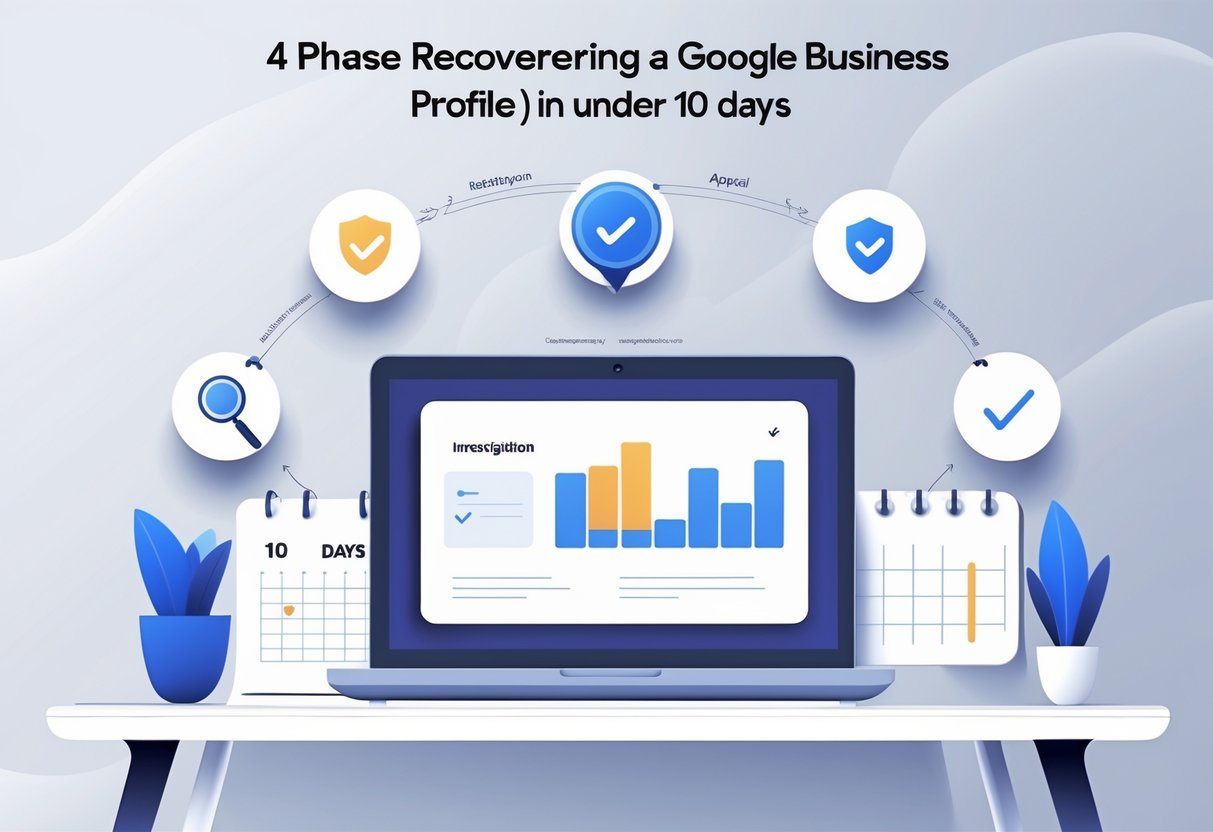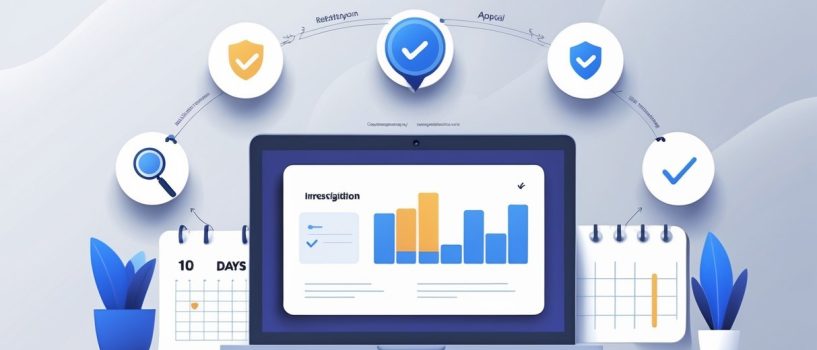A lot of businesses count on their Google Business Profile to pull in customers and stay visible. When that profile suddenly gets suspended, it can really throw a wrench in things and hit sales hard. Quick recovery is the name of the game if you want to keep things running smoothly.

The 4-phase system is designed to get your suspended Google Business Profile back up in under 10 days. It’s straightforward, not rocket science, but it does require following the right steps—otherwise, you could end up spinning your wheels. Knowing how this works can save you a lot of frustration and keep your online presence intact.
1. Identify the suspension reason through Google support
First things first: figure out why Google suspended your profile. Usually, you’ll get an email from them, but let’s be honest—it’s often vague enough to make you scratch your head.
Don’t settle for that. Head over to the Google Business Profile Help Center and reach out to support directly. There’s a form you can fill out to ask for more info or clarification.
Sometimes, Google support will want proof you actually own the business. Be ready to provide whatever they ask for—licenses, paperwork, you name it. The more accurate and upfront you are, the better.
If the suspension is about policy violations or sketchy info, you need to know exactly what tripped the wire. Zeroing in on the cause lets you fix the right thing, fast.
2. Gather and organize business documentation
Dig up every document that proves your business is the real deal—think licenses, tax records, utility bills. These are what Google wants to see to believe you’re legit.
Make sure every document has the right business name and address. If anything’s off, Google might get confused, and that’s the last thing you need. Keep it recent and legible.
Have everything in one place, whether it’s a digital folder or a physical stack. Label stuff if you have to. Seriously, you don’t want to scramble for a tax bill at the last minute.
Being organized makes life easier when Google asks for specifics. Plus, it just looks professional. That can only help your chances.
3. Review Google Business Profile guidelines in detail
Crack open Google’s Business Profile guidelines and actually read them—yes, all the way through. These rules spell out what you can and can’t do on the platform.
Pay attention to the nitty-gritty: business categories, service areas, contact info. Google’s picky, and they want everything accurate. Any slip-ups or fibs could be why you got suspended.
Check the parts about business location, too. Your profile has to show a real, visitable spot. Virtual offices or fake addresses? Big no-no.
Understanding these guidelines helps you spot what went wrong. It also steers you in the right direction for fixing things. Honestly, this step sets you up for a smoother recovery.
4. Rectify all guideline violations
Once you know what rules got broken, fix them. That means scrubbing any false info, avoiding spammy keywords, and double-checking your business location.
Photos and descriptions should actually reflect your business—no exaggerations. If you’ve got fake reviews or over-the-top claims, now’s the time to clean house. Make sure your contact info and phone numbers are spot-on.
Look for duplicate profiles, too. If you find any, merge or close them. This cuts down on confusion and future headaches.
Keep a note of what you fixed. If Google asks for proof, you’ll have it ready. Showing you’ve made changes signals you’re serious about following the rules.
5. Submit a formal reinstatement request
Once you’ve patched things up, it’s time to ask Google for your profile back. Use their official reinstatement form—don’t get fancy, just stick to the facts.
Explain what happened and what you did to fix it. Attach any supporting docs that might help your case: photos, licenses, whatever fits.
Keep the tone polite and professional. No blaming Google or making excuses. Just show you’re ready to play by the rules.
6. Use Google’s reinstatement form accurately
Take your time filling out Google’s reinstatement form. Every field matters, and accuracy is your best friend here.
Make sure your business name, address, and phone number match everywhere—profile, paperwork, the whole lot. Google hates inconsistencies.
Keep your explanation brief and stick to the point. Don’t ramble or toss in unrelated info. The goal is to show you’re compliant, not to write a novel.
Double-check everything before you hit submit. Missing or wrong info just slows things down.
And don’t spam the form. If you’ve already submitted, wait for Google’s reply before trying again. Patience, as much as it stings, is key.
7. Monitor status updates via Google My Business dashboard
Keep an eye on your Google My Business dashboard. That’s where you’ll see updates first—whether you’re still suspended or on your way back.
Refresh often. Sometimes status changes show up in a few hours, sometimes it takes longer. Either way, you don’t want to miss it.
Google might leave messages or notifications there, too. Read everything—they sometimes sneak important instructions into those.
If you’re checking daily, you’ll catch any updates fast and keep your recovery on track. Ignore it, and you could miss something crucial.
8. Prepare a clear explanation letter if requested
If Google wants an explanation letter, don’t panic. Just write honestly about why you think you got suspended.
Own up to any mistakes and spell out what you did to fix them. Keep it straightforward—no jargon, no finger-pointing.
Short and sweet works best. Toss in dates or details if they help, but don’t overdo it. Focus on the suspension reason and how you addressed it.
A polite, professional tone goes a long way. You want whoever’s reading it to see you’re taking this seriously.
9. Respond promptly to additional Google inquiries
After you’ve appealed, keep an eye out for follow-up questions from Google. Sometimes they want more proof or clarification.
Reply as soon as you can, and be clear with your answers. Dragging your feet or dodging questions can drag things out or even get you permanently suspended.
Check the email tied to your Google Business Profile regularly. That’s where most updates land. Quick, honest responses show you’re cooperative.
10. Leverage the Google Business Profile community forum
Don’t sleep on the Google Business Profile community forum. It’s full of people who’ve been in your shoes, plus some real experts.
You can post your own questions or search for answers others have already found. Occasionally, Google staff even chime in with advice.
Being active there shows you’re making an effort to fix things. It’s free, it’s practical, and sometimes you’ll find solutions you wouldn’t have thought of.
If you post, give all the details you can. The more info, the better the help you’ll get. And keep an eye on new posts—sometimes Google changes up their policies and the forum is the first place you’ll hear about it.
Understanding Google Business Profile Suspensions
Google will suspend a Business Profile if you break certain rules or something’s off. When that happens, your listing vanishes from search and maps. Suddenly, customers can’t find you.
Common Reasons for Suspension
Here’s what usually trips up businesses:
- Using a fake or incorrect business name
- Listing a business at a spot where it doesn’t actually operate
- Picking misleading categories or services
- Changing info too often in ways that look suspicious
- Running multiple profiles for one location
- Posting fake reviews or nudging customers to do it
Google’s big on keeping things honest. If your profile looks sketchy or spammy, it’s getting the boot.
Impact of Suspended Profiles on Local SEO
When you’re suspended, you’re basically invisible—no Google Maps, no local search. That means fewer customers finding you, and that stings.
You also lose out on new reviews and customer interactions. Trust and authority in your area can take a real hit.
Meanwhile, competitors are still out there, scooping up the customers you’re missing. The longer you’re offline, the tougher it is to bounce back.
Maintaining Compliance and Preventing Future Suspensions
Being consistent and keeping your info accurate is your best defense against another suspension. Stay on top of the rules and have your paperwork ready just in case.
Best Practices for Ongoing Profile Management
Always keep your profile info fresh and truthful—business name, address, phone, website, all of it. If you change something, update everywhere so nothing’s out of sync.
Stay vigilant for fake reviews or spam, and ditch them fast. Don’t stuff keywords in your descriptions or titles—Google’s not a fan, and it could get you flagged. Posting photos and updates regularly tells Google you’re active, which is a good look.
If possible, have one person in charge of managing the profile. Someone who knows the rules and keeps up with policy changes is worth their weight in gold.
Essential Documentation and Verification Tips
Keep your business licenses, tax docs, and proof of address handy. Google might ask for these to check if your profile’s legit.
Honestly, it helps to scan and stash these files somewhere safe. That way, if they want verification, you’re not scrambling.
When it’s time to verify, pick the method that actually works for you—postcard, phone, or email. Postcards are classic but, wow, they can be slow.
Phone or email is way faster, but only if you’ve already got those set up.
Double-check your business address. If it’s wrong, verification can just… flop, and sometimes Google will suspend the profile.
If anything changes, don’t wait—update both your docs and the profile so everything matches up.




